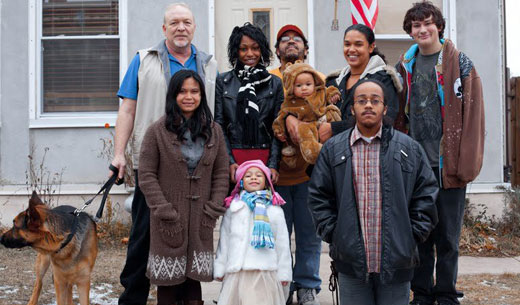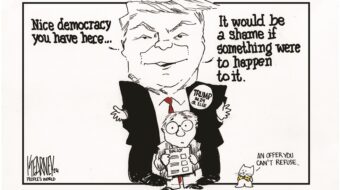
In 20 cities across America today hundreds of protesters disrupted foreclosure auctions, squatted in foreclosed homes and staged dramatic public showdowns against big banks and housing giants. The protests were all part of a National Day of Action to Occupy Our Homes.
Protesters say it was corrupt banking practices that created both the mortgage boom and then the prolonged economic crisis engulfing the 99 percent.
A new national organization committed to squatting in foreclosed homes known as Organizing for Occupation has teamed up with Occupy Wall Street, labor, religious and community groups to form the new group called Occupy Our Homes.
While the unemployed began a week of protests at the seat of government power in the nation’s capital this week, the new movement focused on the very homes where they say people have been victimized by bankers.
Occupy Minnesota, which has already occupied an illegally foreclosed home, is doing it again today by defending the Minneapolis home of Vietnam veteran Bobby Hull from eviction.
Hull, who served as a U.S. Marine in Vietnam, is facing eviction this winter. Hull says he has been living in his home since 1968 when his mother bought it. The title was later transferred to him, and he made timely payments on the house for decades. Over the years his nine brothers and sisters have, at different times, lived in the home.
Although his recent falling behind in payments is the result of several new health problems, U.S. Bank has refused to negotiate with him and says it will evict him and his family in February, the dead of winter, leaving them nowhere to go.
“The banks need to change the way they do business with hard working families,” said Hull, who was pleasantly surprised when he learned Occupy Minnesota was going to help him out. “Thank God this is happening I’ve read the Constitution and I know it’s supposed to be ‘We the People.’ If people start pulling together, we may have a chance, I’ve served my time in Vietnam and I’m not afraid to fight again.”
Story continues after the video.
Bobby’s Story: Facing Foreclosure from Peter Leeman on Vimeo.
Occupy Los Angeles today helped two families re-occupy their illegally foreclosed homes. The first of those homes is owned by a family that has three wage earners, one of whom, Ana Wilson, has cerebral palsy.
With the three incomes, the likelihood of the household being able to pay a reasonable mortgage is good but the bank is foreclosing anyway. The bank in question is Wells Fargo, the Mexican drug cartel money-laundering outfit.
Wilson, a court interpreter, has announced that she and her family are refusing to leave their home after the Wells Fargo foreclosure. Buses brought a variety of activists, including community leaders and union members to Wilson’s home where they are demanding that Wells Fargo reverse the foreclosure and properly evaluate the home for a loan modification.
Occupy Los Angeles is also helping Arturo D., a veteran of the armed forces and long-time aerospace worker who has moved back into his home with his wife and four children after they were evicted. They are demanding that the bank begin accepting payments.
The people reclaiming their homes and the protesters backing them up are particularly angry about what they say is the overt criminal activity practiced by banks that are doing the evicting.
No one at Wells Fargo has been indicted for money laundering despite the fact that the bank has paid millions to settle charges of laundering cash for the Mexican drug cartels that have murdered more than 35,000 people.
Organizers of Occupy Our Homes say the excuse that banks are too big to fail is used to let criminal bankers go free. They say that in addition to the criminality there is also the issue of outrageously poor management that must be addressed. They believe that years of greed, incompetence and neglect have created a situation in which the balance sheets of all the big banks are filled with toxic risks.
Many in Occupy Our Homes say the public should not worry that forcing banks to write off bad loans or forcing them to stop profiting from loans sold deceptively will cause them to fail. They say that TARP was not the end of the bank rescue because the public is funding another enormous ongoing rescue every time people pay loan shark interest rates on credit cards and every time they make payments on an underwater mortgage. (Consumers owe three quarters of a trillion dollars in credit card debt, much of it being paid at loan shark rates of 12 to 29 percent, while banks pay rates from 0 to 3 percent.) Organizers of the movement say their demand is that the government stop using working people and the public to subsidize banks that would, without those subsidies, not even exist.
The banks are extremely worried about developments like Occupy Our Homes because standing right behind the millions facing foreclosure are millions more who have suffered because of predatory mortgage lending even though they aren’t behind in payments or in the foreclosure process.
The last thing the banks want, organizers of the protests say, is opening up of a debate about the fairness of forcing ANY underwater homeowners to pay underwater principal on homes that their banks knew were going to lose value. It’s a debate many of today’s protesters wouldn’t mind forcing on all the banks.
Photo: In this screen shot from the video, Bobby Hull and his family outside their South Minneapolis home from which “they will not be moved.”












Comments